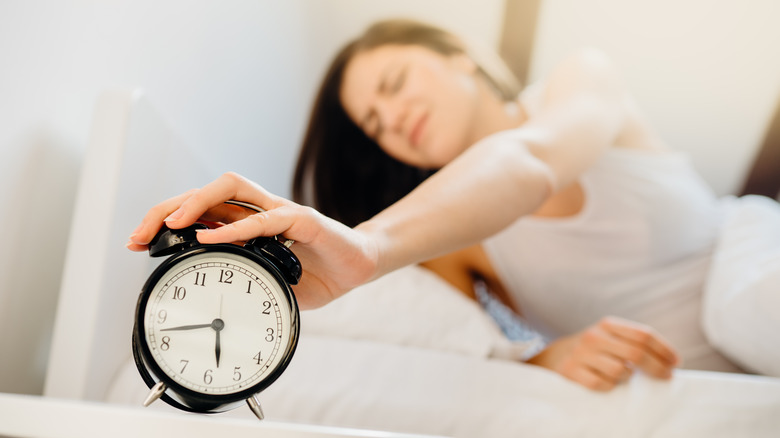This Is Why You Still Feel Tired After A Nap
Naptime is not just for kids. A 2009 survey from Pew Research Center found that more than one-third of American adults take a nap on any given day, and it is not hard to understand why. For many people, naps can have a surplus of benefits such as alleviating stress, enhancing creativity and memory, and improving mood, concentration, and physical performance (per Psychology Today). In fact, research published in the journal Heart suggests that people who nap once or twice a week may be at lower risk of heart attacks.
But let's be honest, most of us don't nap with the intention of protecting our hearts. Many of us just nap because we are tired and want to wake up feeling refreshed and energized. Unfortunately, this is not always what happens. Sometimes, we can wake up from a nap feeling even groggier than before. Certified sleep expert Martin Reed tells Insider that this is called sleep inertia, and there are some steps we can take to prevent it.
What is sleep inertia?
Our first instinct would be to believe that the longer our nap, the more rested we will feel, but this is not necessarily the case. The longer you sleep, the more likely you are to enter a stage of deep sleep, and waking up in the middle of deep sleep can cause you to feel even more tired than you were before. For this reason, Martin Reed suggests (via Insider) that you limit your naps to 20-30 minutes. Enjoying some caffeine right before your nap, or washing your face or exposing yourself to bright light right after your nap, may leave you feeling even more energized (per Clinical Neurophysiology).
Otherwise, waking up at around the 90 minute mark gives your body the time to finish up a sleep cycle, making it less likely you'll wake up during a deep sleep stage, according to Psychology Today. On the other hand, results of a 2015 analysis (via Sleep) suggest that regularly taking naps for longer than an hour may not be the best for your heart, so you may want to minimize your long naps by getting enough sleep at night whenever possible.
However, if your schedule won't let you sleep for at least seven hours at a time, then forgoing the opportunity to compensate won't be great for your health either (per Journal of the American Heart Association). If you feel the need for long naps even if you're getting enough sleep at night, Dr. Michael Breus of Psychology Today recommends bringing this up with your doctor, as it could mean your nightly sleep isn't giving you the amount of rest that it should.


